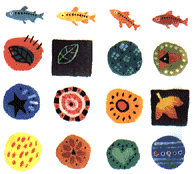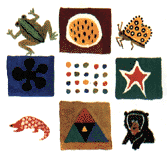(TITLE>ENVIRONMENTAL EDUCATION IN THE ECONOMY OF CHINESE TAIPEI


Environmental Education in the Economy of Chinese Taipei
 |
For the lase four decades,Taiwan has rapidly transformed from an
agriculture-oriented to a highly industrialized modern society,
through the endless effort of the govermnent and the people.The rapid
change can ge partly attributed to our government's well-planned
economic policy,which includes plans for both industrial merchandise
and commercial services sectors. Because of this achievement,Taiwan
has become the focal point for many economists' research. Many people
have made substantial personal material gains during the economic
growth period. |
However,our pubic construction and social development have not yet
caught up with the economic growth.A high standard of living needs to
be achieved.Therefore,how to upgrade the living quality has become a
pubic concern.Environmental protection is one of the key issues.The
general pubic recognizes that environmental protection is currently
one of the most important tasks.If improves our living environment
and consrves the natural resources.Accordingly,the government has
planned mid-and long-term pollution ciontrol and management to
enhance the quality of the environment and promote environmental
protection.
Based on a life-long environmental education concept,we have
implemented an integrated,wellconstructed environmental education
framework.The purpose is to educate our citizens in order to develop
environmental awareness,concern,knowledge and skills.With the
environmental ethics and literacy established,our people would be
greatly responsible for environmental protection,and then oru living
environment could become healthy,comfortable and sustainable.
Traditionally,Chinese people have had a high respect for nature.
This attitude comes from their philosophy--"from earth, to earth." The
ultimate goal of environmentalprotection is to maintain an
ecologically-balanced environment. Therfore, our environmental
education goal is to preserve our conventional Chinese
philosophy--harmony in nature.Hopefully,we could further enhance the
environmental ethics concerning the earth.
To strengthen the general pubic's environmental literacy for
protection environment and conserving natural resources,we have been
vonstructing the following national environmental education policies
and programs in Taiwan.
1.Formulating Environmental Education Policies
"The Policy and Guideline for Environmental Protection at Current
Stage" was issued in 1987 to declare the main goal of environmental
protection implementation.It clearly states that environmental and
ecological protection technology.
In order to continuously promote environmental education for the
"Sustainable Development" concept,"Guidelines for Environmental
Education" was issued in 1991.According to this guideline,all
pertinent governmental departments should research and formulate plans
of action,and eventually move forward towards legislation for
environmental education.
2.Promoting Environmental Education by lntegrating Governmental
Manpower
The Environmental Protection Administration Ministry of Education,
the Council of Agriculture.and the National Park Department of
Construction & Planning Administration,Ministry of Interior are
presently in charge of promoting environmental education and training
related teachers.
3.Establishing Research Institutions and Facilities for
Environmental Education
 |
We currently have the following research institutions and
facilities for environmental education.
(1)One graduate school of environmental education:to assist our
environmental curriculum development,the distribution of information,
academic graduate research and training related to environmental
education.
(2)Twelve environmental education centers locally-distributed among
three universities and nine colleges:to produce teaching guides and
to train local pre-service and in-service teachers from three thousand
elementary and junior middle schools. |
(3)Fifty-two social education institutions:to provide display
centers,classrooms and theaters, lectures,multi-media programs, and
seasonal activities related to environmental protection and education.
(4)Five national parks and eighteen nature preserves:to provide
space and facilities such as visitors' centers,ecological centers,
interpretation service stations,and self-guided interpretation
facilities.
(5)Eight nature centers: to promote outdoor environmental teaching
and learning for elementary and junior middle schools.
4.Implementing Environmental Education Strategies
This plan includes the formulating of all environmental education
projects, and encouraging and assisting students and adults of all
ages to be involved in these projects. The purpose is mainly to arouse
environmental sensitivity, concern, knowledge, and actions.
(1)Formal Environmental Education Development for Schools
1)Environmental protection team
 |
Environmental education projects and activities have been designed
and incorporated into the school system annually. Currently, an
"environmental protection team" consisting of a selected group of
teachers,has been organized in each of the three thousand elementary
and junior middle schools in Taiwan to carry out the environmental
protection mission on campus.
2)Teachers'in-service environmental education workshops
School teachers are the key ingredient of the environmental
education system. There are over five thousand teachers attending |
environmental protection/education workshops provided by our
government agencies,and environment- or educationrelated societies,
foundations and associations. Particularly, our twelve environmental
education centers play important roles in elementary and high school
teachers'in-service training in Taiwan.
3)Environmental Curriculum Development
Currently, we have already incorporated a substantial amount of
environmental protection reated materials into our school curriculum.
To better cope with global development, we are going to integrate more
environmental knowledge and skills into school environmental
curricula. All levels of leaming materials are being amended. A series
of supplementary materials including bookets and audio-visual tapes
are being designed for various groups of different backgrounds and
ages from kindergarten to adults as well. As for universities and
colleges, several environment-related courses such as ecology,
environmental science, environmental protection and environmental
education are provided to enhance students' environmental literacy.
(2)Non-formal Environmental Education Development for Communities
Various educational plans and activities were designed for the need
of different groups. With the use of mass media, several environmental
education activities are planned on the basis of collaborating with
various groups, and corporations:
1)The National Society of Environmental Education founded in 1992,
to propagate and evaluate our environmental education.
Eighteen foundations and ninety-eight associations related to environmental protection, to promote environmental education tasks
under the government's programs and financial support. The control and
prevention of dengue feverset a successgul example.
5.Awarding for persons or groups promoting environmental education
To encourage a national involvement of environmental protection, a
series of evaluation processes with awards and honors have been
developed. Those include "schools and teachers with contributions in
environmental protection," "local persons with contributions in
environmental protection," and "outstanding environmental protection
volunteer workers." Outstanding representatives are selected, awarded
and granted an audience to the President.
6.Conducting Basic Research on Environmental Education
Since 1988, we have conducted much research or environmental
education. The representative topics includes "students' environmental
awateness and knowl edge," "the content of school environmental
curriculum, and "the pedagogy of environmental education."
In the future, research on the fundamentals and applications of
environmental education will be continu ously undertaken on the basis
of "resource integratior planning." The core subjects will include:
1)Environmental concepts
2)Strategies for teaching environmental values
3)Environmental behavior
4)Environmental literacy model
5)Pre-service and in-service teachers training
6)Outdoor environmental education
7)Environmental education models for professional groups
The environmental conference held at Rio de Janeiro Brazil in June
1992 has drawn global attention. People have recognized that under the
deteriorating condition of the environment, our common future should
mort toward "Sustainable Development." This conference is a new
be-ginning and an important milestone to improving the liv-ing
environment through international cooperation. It is anticipated that
with the support from various groups our environmental education can
make progress on the cur-rent basis. We should be more actively
involved in global environmental protection affairs and consider
environmental protection as our most urgent goal.
"Thinking globally,acting locally." To reach the goal of being
involved in global environmental education,we are willing to actively
play the role as the "information exchange center from environmental
education in the Pacific area." The domestic environmental education
manpower and information network system was estab-lished from this
purpose. We actively collaborate with countries in the Asia-Pacific
region to establish an international environmental education manpower
and in-formation network system to achieve the goal of international
environmental education collaboration.
 |
In the 90's,the Asia-Pacific region has gradually be-come an
important center of world trade.Along with the economic
growth,environmental protection is of great im-portance.In order to
develop economics accompanied by environmental protection,we ought to
focus on the funda-mental work of environmental education including
formu-lation of regulations from environmental education,re-search on
basic environmental education,and applications of environmental
education.We shall do our very best in all aspects to achieve a
wonderful"global village."/td> |
Providing Source ¡G Àô «O ¸p
File Last Revised ¡G Feb.8.1996
Contact Phone¡G 886-2-3117722 EX 2332





